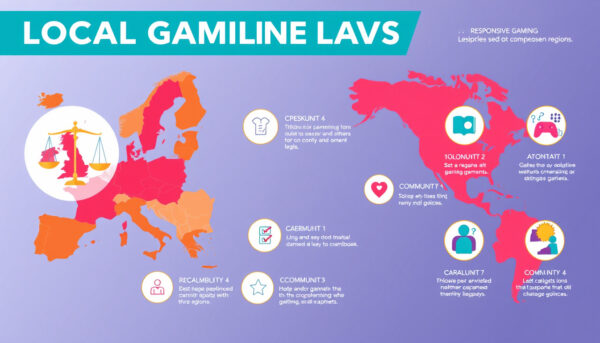Navigating Local Gambling Laws: A Comprehensive Review for Responsible Players

Understanding local gambling laws is essential for anyone wishing to partake in gaming activities responsibly. With varying regulations across states and even municipalities, being informed can help players avoid unintentional legal issues and promote responsible gambling practices. This article reviews the current landscape of gambling laws in different areas and highlights key points players should consider.

Overview of Gambling Legislation in the U.S.
The legality of gambling in the United States is complex, as it evolves over time with legislation varying widely not only from state to state but also between local jurisdictions. Federal laws lay the groundwork, but each state holds the authority to regulate gambling within its borders. Types of gambling that are commonly regulated include casinos, sports betting, lottery games, and online gambling.
As reported by the National Council on Problem Gambling, states such as New Jersey and Nevada have established comprehensive frameworks for both land-based and online gambling. In contrast, states like Utah and Hawaii maintain stricter anti-gambling laws, not permitting gambling in either form. This patchwork of regulations underscores the importance for players to understand their local laws before engaging in any gambling activities.
Key Considerations for Players
-
Know Your State’s Laws: Each state has its own set of regulations concerning gambling. Websites like Gambling-Law-US.com provide detailed summaries of these laws, making it a valuable resource for understanding what is legal and what isn’t. It addresses both state and federal laws that govern various gambling activities, including the rise of online gambling.
-
Licensing and Regulation: Understanding how licensing works is crucial, especially if you’re considering opening a gambling business or working in one. Different jurisdictions may have distinct licensing requirements, which can affect both players and operators. The Gaming Law Review highlights the legal nuances associated with licensing in different states and on tribal lands.
-
Responsible Gambling Practices: The National Council on Problem Gambling emphasizes that while gambling can be an enjoyable pastime, it’s important to practice it responsibly. This includes being aware of one’s gambling behavior and seeking help if necessary. Many states provide resources and support programs to assist individuals who may be struggling with gambling issues.
-
Emerging Technologies and Gaming: With the advent of digital gaming and mobile betting, many states are grappling with how to regulate these new platforms. Article updates in legal journals such as the Gaming Law Review discuss the regulatory challenges posed by online and mobile gaming, illustrating the need for laws to adapt to technological advancements.
-
Potential Legal Consequences: Engaging in illegal gambling activities can result in significant legal repercussions, including fines and imprisonment. Understanding local laws not only helps in safeguarding one’s interests but also ensures compliance with the law.
Conclusion
Navigating local gambling laws requires diligence and awareness of the legal environment in which you reside. As gambling continues to evolve, both in terms of technology and legality, staying informed is not just beneficial; it’s essential for responsible players. Always take the initiative to review the specific regulations in your area and seek legal advice if necessary to ensure a safe and enjoyable gambling experience. Staying updated through resources like the National Council on Problem Gambling and state-specific information sites can provide critical insights into the legality of various gambling formats in your local area.
